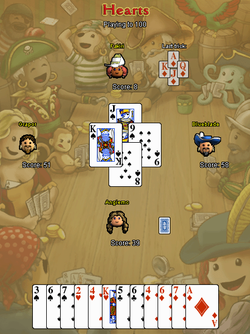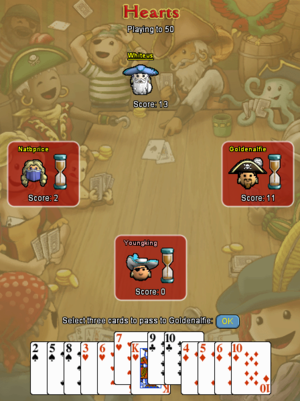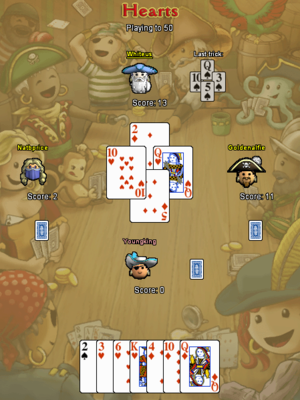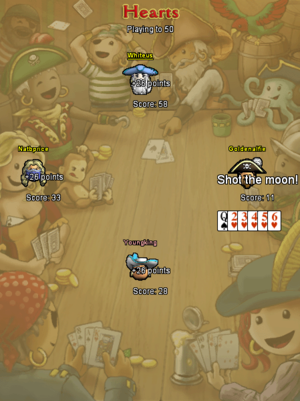Hearts
Hearts is one of three card games available at a parlor games table. It can also be played at a patron's card table or a hearts table. It is free to play two days a week.
Contents
Background
Hearts is thought to have evolved from Reversis, a trick-taking game invented in 17th century Europe which became popular with the French aristocracy. In Reversis, as in hearts, tricks containing specific cards awarded a penalty to the winner of the trick. However, Reversis also involved huge numbers of counters and side payments. Hearts emerged in the 19th century as a simplified alternative, where each heart was worth 1 point. The Queen of Spades was introduced in a variant known as Black Maria, which is now known as the standard variant of hearts. With the advent of the internet, and with the game's inclusion into a well-known domestic operating system, hearts has become a popular card game around the world.
Setting up the game
As with all parlor games, entry can be restricted to players within a certain standing range, and/or restricted to pirates in the same scene only. Watching may be enabled or disabled, and an optional wager on the outcome of the game can be set.
The creator of the table can control 3 additional variables at the table:
Payout type
This setting determines how the wagered Pieces of Eight are split among the winners. If no wager is set on a game, this setting does nothing. Note that NPPs which replace players do not take prize money, even if they win.
- Winner takes all - The winner will take all prize money. In the event of a tie, the prize money is split between the winners. If a NPP wins, the PoE is sunk.
- Proportionate take - The player (or players) with the most points will receive no PoE. All other players will receive a share of the prize money, even if those players have also exceeded the score limit. The player (or players) with the lowest points receives the most, and the remaining players receiving proportionately less according to the difference between their score and the winning score(s).
Play to
The game will continue until at least one player has reached the score specified here. Scores can be one of the following:
- 50
- 100
- 200
Pass option
In each round of a hearts game, pirates pass cards to one another. This setting determines the order which pirates will pass cards to one another, and has the following options:
- Left, right, across - pirates will pass left, then right, then across.
- Left, right, across, hold - the same as above, with no pass on the fourth round.
Gameplay
| 13 cards of the hearts suit, ranked from 2 (low) to Ace (high). |
Hearts is a trick-taking game for four players, divided into rounds of 13 tricks each, played with a standard pack of 52 cards. It is played up to a score of 50, 100 or 200 points. When one player reaches that score, the game ends, and the person with the lowest score wins.
The players in a game of hearts are commonly referred to using the cardinal directions; the rightmost player is known as "East", and proceeding clock-wise the others are known as "South", "West", and finally "North".
Passing
Each player is dealt 13 cards at the beginning of each round. After the deal, each player passes 3 cards to another player. In the first round, everyone passes these 3 cards to the person seated to their left; in the second round, players all pass to their right; in the third round the cards are passed to the player seated opposite them. If the Pass option specified "hold", no cards are passed in the fourth round. Passing continues in this sequence; if "hold" is not specified, the fourth and fifth rounds will involve passing left and right again. After the cards have been passed, the player with the 2 of clubs must "lead" (play the first card of the trick) with that card.
Tricks
A trick is a set of four cards, one played by each player. There are 13 tricks per round, thus in each round all of the 52 cards are played. Play revolves in a clock-wise fashion after all cards are passed: the player to the left of the person who led the 2 of clubs plays a card, followed by the player to their left and so on. The tricks work according to standard trick taking rules - a player must put down a card of the same suit if they can (or follow suit), but are otherwise free to play any card. The highest card of the led suit will win the trick. Unlike spades, hearts has no trump suit, and thus if a player can not place a higher card of the led suit on the table then that player can not win the trick.
Once all players have played one card, the trick is complete, and the person with the highest ranking card in the original (led) suit wins it. They now lead the next trick, choosing any card they wish*. Play continues in this fashion until all 13 tricks have been taken, after which the round is over and player scores are totalled up.
*Note that heart cards must be 'broken' (played previously) before they can be led, or the player must have nothing but heart cards in his or her hand. Additionally, one can not play a heart card or the queen of spades on the very first trick.
Objective and points
The goal in hearts is to score as few points as possible. Players will gain points by winning tricks that have either hearts or the queen of spades in them. Each heart is worth one point, while the queen of spades is worth 13 points.
However, when one player captures all heart cards and the queen of spades (called "Shooting the moon"), then that player receives 0 points while all other players receive 26 points. This is unless another player would win the game as a result of shooting - if this is the case, the player who has shot the moon will lose 26 points from his or her own score.
At the end of each round (13 tricks), player scores are added up. If no player has reached the score limit, play continues, cards are passed again and another round begins. As soon as a player reaches the score limit, the game is over.
Winning
The game ends as soon as one or more player reaches the score limit. The player with the least points wins the game. If a wager has been placed on the game, the Pieces of Eight will be distributed according to the Payout type setting. Players' standings may also increase or decrease.
Rematches
Players may vote for a rematch at the end of a game, provided they can meet the required wager. Note that players do not have to meet standing requirements for rematches if their standings have changed. A vote of 100% (all four players) is required to begin a rematch, and if at least one player is absent then no rematch is possible.
Leaving the game
Players are booted from hearts if they disconnect, log off, or are forced out of the game by another puzzle starting. Additionally, players may leave the table at any time by clicking the "dismiss" button.
A player who leaves the table for any reason forfeits all PoE on the table, and his or her standing may decrease as a result of leaving. Leaving a game will also cause an NPP to take that player's place. If there is a wager on the table, the NPP will not win PoE - even if a player with that score would be eligible to win PoE. Instead, the PoE wagered is divided among the other winners if the Payout type allows it - otherwise the wagered PoE is lost.
Etiquette
Hearts etiquette is similar to that of other card games. It is not a set of rules, but instead a list of good practices which can help to keep the game enjoyable for other players. While some points of etiquette may differ between hearts variants, platforms and even countries, some of the more common points and the rationale behind them are listed below. Note that players who know one another well may choose to forego some of the etiquette listed here.
- Players should not disclose the location of any cards which have yet to be played; doing so may give a player an advantage and change the outcome of the round. Additionally, some players hold that cards should not be discussed at all until the end of the round. This is sometimes considered an unwritten rule in hearts, spades and poker. This is normally tolerated with warnings from other players, but repeat offenders may find themselves victim to a complaint.
- Discussing tactics and/or sharing cards with another player is considered cheating and is not tolerated by Ocean Masters or players - particularly in scenarios where large wagers have been placed. It is also known as collusion.
- Pointing out a player's strategy, for example an attempt to "shoot the moon", is also collusion by definition and some players may object to it - particularly if their strategy involves trying to shoot the moon.
- Stalling - or deliberately slowing down the game - is not well received by the majority of players, unless all participants agree to do so(for example, all players are willing to wait for a player to return). There is never any obligation for a player to stall.
- Chatting during a game is acceptable to the majority of hearts players, provided that the things being said do not influence the gameplay. For instance, it would be acceptable to discuss trips to the Cursed Isles, but it would not be acceptable to comment on players' tactics.
- It is important for a player to be polite, whether they are winning or losing. Saying "Good luck", and "Good game" are entirely optional, but are well-received by other players and together with conversation can make for a more friendly game. Of course, nothing is stopping a player from calling out "Ye lucky greenie!" after a loss, but this will not garner much respect from fellow players.
- Some players prefer that everyone passes a low heart during the pass phase of a round, since it inhibits the ability of the recipient to shoot the moon and give everyone a bad score. However, this is a matter of strategy, not etiquette, since it could be in a player's interest to not pass a low heart. The same applies for "covering" a pass made to another player, which is also a matter of strategy and not etiquette.
Historical notes
- Hearts was introduced with release 2005-04-26.
- Sound effects and pass direction chat messages were added with release 2005-05-02.
- The option to pass left-right-across (as opposed to left-right-across-hold) was added with release 2005-08-10.
- With release 2011-02-22, hearts became accessible via the patron's card table furniture item.
See also
Ultimate list
| Cerulean | Emerald | Ice |
|---|---|---|
| Jade | Meridian | Obsidian |
| Opal | ||
Trophies
The following trophies are related to Hearts:
- Hearts Trophies
External/other links
| |
| See also: Tournament |
| Cerulean | Emerald | Ice | Jade | Meridian | Obsidian | Opal | |
| Atlantis Explorers Across: | |||||||
| Barbarian Lovers Across: | |||||||
| Brigand King Hunters on: | |||||||
| Cursed Isles Attackers Across: | |||||||
| Drinking Players Across: | |||||||
| Flotilla Hunters Across: | |||||||
| Greedy brigand Hunters Across: | |||||||
| Haunted Seas Explorers Across: | |||||||
| Hearts Players Across: | |||||||
| Kraken Hunters Across: | |||||||
| Memming Players Across: | |||||||
| United Pillagers Across: | |||||||
| Skellie Hunters Across: | |||||||
| Spades Players Across: | |||||||
| Vampirate Hunters Across: | |||||||
| Werewolf Hunters Across: | |||||||
| Zombie Hunters Across: | |||||||














